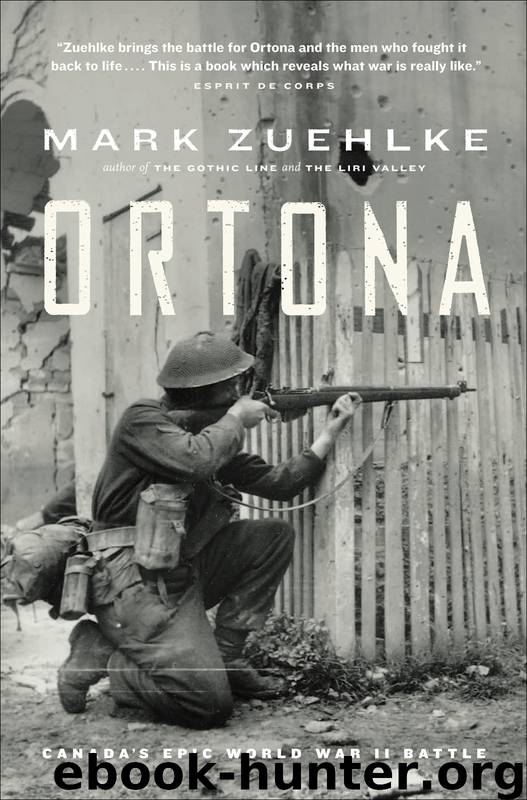Ortona by Mark Zuehlke

Author:Mark Zuehlke [Zuehlke, Mark]
Language: eng
Format: epub
Tags: HIS027160
Publisher: D & M Publishers
Published: 2003-03-24T16:00:00+00:00
For fifteen-year-old Antonio Di Cesare, artillery was more of a danger than ever. Villa Deo, near Villa Grande, was being fired on more often by the Canadian guns. Some distance behind Villa Grande, the Germans had set up light artillery and heavy mortars. Their fire attracted counterfire. Enough of this fell short to make the fields surrounding Villa Deo dangerous, so the civilians no longer tried to work them. They stayed indoors most of the time. They waited for the Allies to come and liberate the village. They waited for the war to pass.27
To the immediate east of a ravine bordering Ortona, former navy gunner Antonio D’Intino refused to be driven from the fields. It was now more necessary than ever for him to tend the olives and vineyards. Explosions and shrapnel from artillery inflicted terrible damage on his plants. Pruning and staking were required to save them. The lines that held up the grape vines had to be constantly replaced. The family farm was pocked with shell holes. Then there were the dud rounds in the mud. Some disappeared entirely, forming deadly mines that he had to be careful not to unearth or trigger when tilling the soil. Others lay with detonators exposed. Having handled munitions for years in the navy, D’Intino was not scared by these shells. The twenty-eight-year-old would defuse them himself and render them harmless. If for some reason that appeared too dangerous, he would use some of the explosive from shells he had dismantled to blow the new one up.
When the shells fell on his farm and D’Intino was caught in the open, he took cover in the nearest of the many small holes he had dug for shelter from the German work crew roundups. The Germans who were now in Ortona had no further interest in D’Intino, as there were no more work crews. The soldiers were only interested in what vegetables he had in the garden that were ready to harvest. He could not stop them carrying off the food. D’Intino and his aged father frequently went hungry as a result. His father’s health worried him. The old man grew weaker each day. He could not go outside, for he could not run fast enough to reach shelter if the shells came.
Across the ravine, Ortona was sometimes battered by shells or Allied bombers. Often smoke rose from the town. D’Intino also heard the sound of explosives going off throughout Ortona. He wondered if the Germans intended to destroy the entire town. Why else were there so many explosions?28
Americo Casanova had been sent to Tollo, a village to the north of Ortona and Villa Grande. His mother had thought the thirteen-year-old would be safe there from the fighting. Now the shelling of Tollo was increasing daily because of the nearby German artillery and mortar emplacements. Americo and about 150 other civilians took shelter in a large cave near the village. The cave had a big stone house in front of it. It had been the house’s winery, and made an excellent shelter from the bombardments.
Download
This site does not store any files on its server. We only index and link to content provided by other sites. Please contact the content providers to delete copyright contents if any and email us, we'll remove relevant links or contents immediately.
| 19th Century | 20th Century |
| Exploration | First Nations |
| Founding | Pre-Confederation |
| Province & Local | War of 1812 |
Cat's cradle by Kurt Vonnegut(15320)
Pimp by Iceberg Slim(14476)
4 3 2 1: A Novel by Paul Auster(12362)
Underground: A Human History of the Worlds Beneath Our Feet by Will Hunt(12080)
The Radium Girls by Kate Moore(12011)
Wiseguy by Nicholas Pileggi(5762)
The Fire Next Time by James Baldwin(5421)
Perfect Rhythm by Jae(5390)
American History Stories, Volume III (Yesterday's Classics) by Pratt Mara L(5292)
Paper Towns by Green John(5173)
Pale Blue Dot by Carl Sagan(4992)
A Higher Loyalty: Truth, Lies, and Leadership by James Comey(4944)
The Mayflower and the Pilgrims' New World by Nathaniel Philbrick(4483)
The Doomsday Machine by Daniel Ellsberg(4477)
Killers of the Flower Moon: The Osage Murders and the Birth of the FBI by David Grann(4431)
The Sympathizer by Viet Thanh Nguyen(4381)
Too Much and Not the Mood by Durga Chew-Bose(4324)
The Borden Murders by Sarah Miller(4302)
Sticky Fingers by Joe Hagan(4181)
